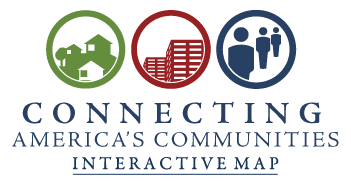BTOP in Action
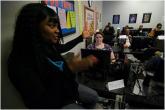
St. Paul, Minnesota celebrated Broadband Access Day on December 9, 2010, in honor of the University of Minnesota’s (UMN) Broadband Access Project (BAP). The University is collaborating with 12 community organizations—four in St. Paul, three in South Minneapolis, and five in North Minneapolis—to expand access to high-speed Internet and the opportunities it brings in many areas of life.
The St. Paul public computer centers (PCCs) held grand opening events on December 9, welcoming representatives from municipal, county, state, and Federal elected offices, as well as community partners and PCC users. A bus took visitors to each of the four sites: Asian Community Technology Center, Hmong American Partnership, Lifetrack Resources, and the YWCA St. Paul.
Through UMN’s $2.9 million BTOP grant, the organization has renovated 11 public computer sites and has created 16 new jobs in the first year of the program. Training classes at each site are targeted at a wide variety of groups including small/disadvantaged/minority-owned businesses, nonprofit organizations, individuals, and community groups. Currently, users can choose from training classes including introductory Internet classes, Microsoft Office® suite basics, job search help, resume building, and college prep. BAP staff develops additional courses as needs arise.
BAP will primarily benefit individual PCC users, a wide range of people from all age groups, unemployed and underemployed, immigrants, and refugees – by helping them develop important computer skills, search for jobs, and enhance their education. In addition, non-profits affected by significant levels of funding cuts will have the opportunity to support staff development and small business owners will learn how to use technology to increase their customer base through online promotions and other communications.
Last Updated: October 18, 2011.
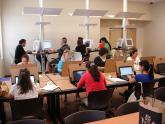
The Santa Fe Civic Housing Authority (SFCHA) opened the new Hopewell Community Center/Public Computer Center on June 3, 2010, and, four days later, kicked off daily classes for the community. Mayor David Coss and children from the neighborhood cut a ribbon to mark the opening. English as a second language and computer classes were almost at capacity from the beginning and General Equivalency Diploma (GED) classes were generating similar interest. The new center will offer broadband access and computer training to low-income families, minorities, and disadvantaged youth as well as disabled and elderly Santa Fe residents. SFCHA expects to complete improvements on a second PCC by fall 2010.
Last Updated: November 22, 2010
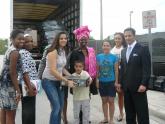
The School Board of Miami-Dade County launched the Learn Ideas, Navigate Knowledge (LINK) program in 35 low-income elementary, middle, and high schools across the Miami-Dade County Public Schools district. This program promotes broadband adoption among economically distressed populations by providing the necessary training and equipment to students and their families. The school board partners with non- and for-profit organizations to provide computers, Internet service, and multilingual digital literacy training to participating families.
The LINK program created an Introduction to Computers class through its partnership with The Parent Academy. Through this class, participants learn computer basics, Internet fundamentals, and how to use LINK’s Parent Portal. Once completed, participating families receive a free personal computer and access to its Parent Portal, an online tool that allows parents to view students’ grades and keep in contact with teachers. Additionally, a video of the Introduction to Computers class, available in English, Spanish, and Creole, is pre-loaded onto each computer along with anti-virus and word-processing software.
As of July 2011, BTOP funds have helped the school board distribute computers and provide Internet service to more than 2,400 families. Additionally, BTOP funding has allowed the program to employ instructors from The Parent Academy for its Introduction to Computers class. By the end of the project, the LINK program is expected to provide computers and Internet access to approximately 6,000 households.
Last Updated: October 18, 2011
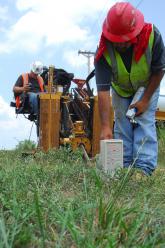
On June 21, 2011, Sho-Me Technologies, LLC began construction on the first new fiber segment of the Sho-Me MO middle-mile project. Combined with 880 miles of existing fiber, the project will deploy a total of 500 miles of new fiber to complete a 1380-mile fiber network across 30 counties in south and central Missouri. Sixty workers are diligently constructing the network to bring high-speed access to 100 community anchor institutions, including K-12 schools, community colleges, public libraries, health institutions, and various local governments. This middle-mile fiber backbone will enable distance learning and telehealth, enhance public safety applications, and expand opportunities for economic development across Missouri.
As a middle-mile project, Sho-Me MO is a part of a five-year initiative, MoBroadbandNow, launched by Missouri Governor Jay Nixon in 2009. The initiative is seeking to expand broadband accessibility to 95 percent of the total state population, a significant increase from the current projected accessibility of 80 percent. During the State Fair, Sho-Me Technologies’ Jerry Hartman presented project updates to Governor Nixon and other state legislators. The Governor also acknowledged the Sho-Me MO project is advancing his “MoBroadbandNow” initiative to expand broadband access throughout Missouri.
Sho-Me Technologies recently connected the State Fairgrounds near the city of Sedalia to the network, so the Department of Agriculture, State Fair Community College, Sedalia school district buildings, and other public safety agencies operating at the State Fairgrounds could have high-speed Internet access. Missouri’s state government has taken an active role in moving agriculture into the Internet age by educating rural farmers on how to use a variety of online tools. For example, the state is teaching farmers how to use smart energy meters to reduce utility bills through energy efficiency methods. In another class, the state is training farmers how to use broadband and GPS technologies to track weather patterns for crop irrigation. The state is also educating farmers on how to trade commodities in real time with global markets using video conferencing and YouTube instructional videos.
Once completed, the network could provide affordable and accessible broadband service for up to 260,000 households and 66,000 businesses by enabling local Internet service providers to utilize the project’s open network to extend and improve their offerings.
Last Updated: December 7, 2011

SDN Communications is moving swiftly to deploy the state’s new middle mile network before the ground freezes this winter. Throughout South Dakota, SDN crews are hard at work deploying a network that is the core of a $25 million investment to connect more than 300 anchor institutions – schools, hospitals, public safety agencies, and government offices – in 75 South Dakota communities.
SDN has two years to complete connectivity, an aggressive timeline since South Dakota winters will halt construction for four months a year. One of the first BTOP infrastructure recipients to break ground, the company put an estimated 50 construction workers on the job, not to mention the administrative workers and consultants managing the projects. Work started in Rapid City in August, and crews broke ground in Vermillion, Watertown, and Yankton in September. Vermillion’s nine anchor institutions will be service-ready by mid-November. The other three communities will be ready by year’s end.
To see local news coverage, please visit here. To experience the impact of the project up close, watch SDN’s BTOP Stimulus Project video.
Last Updated: May 9, 2011.

The State Library of Louisiana’s BTOP project, “Louisiana Libraries: Connecting People to Their Potential,” has held more than 1,200 free digital literacy and software classes and will supply 640 laptop computers to libraries throughout the state by the end of the year. With these efforts, the State Library seeks to improve the workforce skills of Louisiana citizens and provide a solid economic foundation for strengthening Louisiana communities.
The free classes offer provide workers and job seekers the technology skills needed to succeed in the digital economy, including professional-grade classes in the most widely used business software, such as Microsoft® Office, Adobe® Creative Suite, and Quicken®. Louisianans also can take business skills classes to improve their proficiency on topics like Getting Your Job Search Started, Mastering the Interview, and Business Etiquette. Additional training helps people make maximum use of technology with classes in Computer Foundations, Introduction to Home Wireless Setup, and Home Computer Security.
In addition to the classes, the State Library will deploy 10 Internet-ready laptops to each parish, so citizens can borrow them through their local library and connect to any hot spot to get online. The primary goal is to promote broadband use so that citizens may become comfortable and familiar with this technology. The State Library also created the Louisiana Jobs & Career Center website, www.lajacc.org, which offers career tools and displays searchable job postings for the public.
Last Updated October 18, 2011.
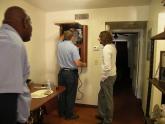
“Having access to the Internet is like having a stove or refrigerator or a phone. You can’t function with it,” said Jerome Ryans, President and CEO of Tampa Housing Authority (THA). THA is turning this idea into a reality at its 23 housing sites in Tampa, Fla. As part of its AccessALL Tampa project, THA has turned on Internet access in all of the area’s 3,554 public housing and low-income housing units.
Since receiving a $2.1 million BTOP grant in August 2010, over 150 residents have completed THA’s “Intro to Microsoft Windows 7®” course. An additional 200 students are enrolled in sessions beginning in April 2011. Instructors provide individualized attention to small classes of 15 or 20 students encouraging them to interact and ask questions. A total of 68 students are enrolled in an A+ Certification program, a course designed to teach students how to configure, troubleshoot, install, and upgrade computers. THA hopes these training courses will not only increase broadband adoption, but also provide tenants with marketable skills to increase their employability.
In keeping with the idea of a computer as an appliance, THA is also implementing a SmartUnit pilot program in 197 housing units. Computers are being installed at permanent kiosks in each of the participating units. Tenants in these units are required to attend a six-week introduction to Microsoft Windows 7®. The course also includes Internet safety information targeted towards parents since many of the SmartUnits house families with young children. As part of the pilot program, THA is conducting a survey of school children to determine how access to a computer and the Internet at home affects grades. THA is surveying grades received prior to installing the computer kiosks and plans to compare them to grades received in subsequent semesters. THA hopes that broadband and computer access will have a significantly positive impact on the grades of students living in SmartUnit communities.
Last Updated: October 18, 2011.
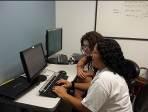
In 2011, Technology for All’s (TFA) Texas Connects Coalition project created or refurbished 71 public computer centers. These centers are a part of a statewide campaign to help those without access to computers and the Internet acquire the digital literacy skills needed to participate in today’s modern workforce.
Using BTOP funds, TFA has been able to make available approximately 350 computers to underserved community members, providing free Internet access to an average of 13,600 users per week. Along with free computer access, the centers provide a variety of resources to help local residents develop technology skills that will make them more competitive in the job market. The centers offer workforce development assistance for resume creation, job searches, and interview preparation. The centers also provide classes covering topics such as computer basics, Internet fundamentals, word processing, and business software, such as Microsoft® Office.
TFA’s job training efforts are already making a huge impact on Texas residents. More than 46,000 students have participated in TFA’s classes. According to TFA, in many communities, residents are using their newly developed computer skills to find and retain jobs. For example, a single parent who was on a fixed income and could not to purchase a computer or broadband service for her home was able to use a TFA center in Houston, Texas, to connect to the Internet. At the center, she developed computer skills, and learned how to update her resume and search online for employment opportunities.
Last updated: April 17, 2012
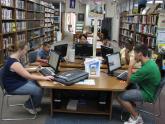
As of July 2011, the Texas State Library & Archives Commission has upgraded public computer centers at 11 libraries throughout the state. Known as the Technology Expertise, Access and Learning for all Texans (TEAL) project, this initiative is providing computer access and training opportunities for the state’s most underserved populations across 38 partnering library systems. BTOP funds already have helped these learning institutions replace 153 existing computers and deploy an additional 163 workstations, connecting an average of 3,500 users per week to online resources.
TEAL also offers professional development webinars for library staff. These webinars provide librarians with tools and techniques to manage and promote computer resources, enabling libraries to better meet patrons’ technology needs. To date, TEAL has facilitated 10 webinars for approximately 744 library staff members, helping them improve their understanding of technology to boost sustainable broadband adoption. TEAL offers webinars on a variety of topics including a series on how to promote and teach computer technology with seniors and people with disabilities. TEAL also partnered with the Texas Workforce Commission to create a series of workforce skills webinars, teaching librarians how to help library patrons with their job searches and career development.
TEAL is using approximately $8 million in BTOP funds and $3.7 million in non-Federal matching funds to provide 2,200 new workstations in 155 new or upgraded public computer centers and directly create more than 100 full- and part-time jobs. As of July 2011, BTOP funds have allowed the Texas State Library & Archives Commission to hire four full-time employees to conduct training workshops and help manage the public computer resources. To see local media coverage, please visit The Smithville Times.
Last Updated: October 18, 2011
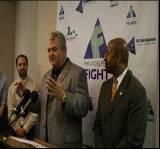
Philadelphia Mayor Michael A. Nutter helped launch the Freedom Rings Partnership at the April 26, 2011, official opening of the FIGHT Computing Center, the first of the project’s 77 public computer centers to provide digital literacy and workforce training opportunities.
FIGHT is one of 13 local agencies working with the city’s Division of Technology to provide broadband Internet access, computers, and training to Philadelphia’s most economically and socially vulnerable populations. The Urban Affairs Coalition, a lead partner in this initiative, will provide computer and technology training opportunities at many computer center locations.
The Freedom Rings Partnership plans to create 177 full-time and part-time jobs. The 77 computer centers will include 19 recreation centers, 29 community-based organization sites working with high-risk populations, 10 homeless shelters, 15 other affordable housing sites, and four mobile labs that will reach communities lacking space or the capacity to house a computer center.
In addition to services provided at citywide computer centers, the Freedom Rings Partnership will encourage Philadelphians to “get connected” to technology in their homes. The participating partners expect to serve approximately 15,000 people per year and use a citywide outreach campaign to deliver information about the importance of broadband technology to more than 100,000 households.
To see local media coverage of the April 26 event, please visit The Philadelphia Inquirer. To read the mayor’s official report about the Recovery Act at work in Philadelphia, please visit here.
Last Updated: October 19, 2011.





















